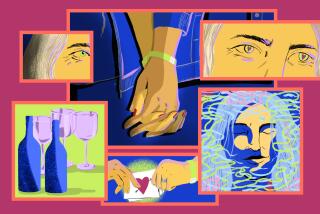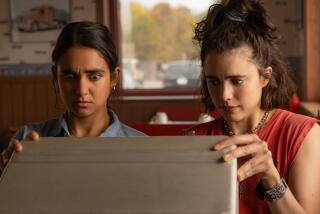Isn’t It Daringly, Absurdly Romantic?
“Love is strange,” the old rock lyric insists, and it’s never been stranger, more unsettling and more exuberantly unexpected than in the daring high-wire act Paul Thomas Anderson shrewdly calls “Punch-Drunk Love.”
Anderson, the gifted writer-director known for such intense and creative films as “Boogie Nights” and “Magnolia,” is not the person you’d expect to be turning out a 97-minute made-for-each-other romantic comedy, but a desire to challenge himself is what led him here, and something completely different is the postmodern result.
What Anderson and his equally unlikely stars, Adam Sandler and Emily Watson, have managed is to stretch the boundaries of the romantic comedy genre to their extreme outer limits. Charming and outlandish by turns, this misfit love story of disconnected people trying to find one another in an antagonistic world is a comedy of discomfort and rage that turns unexpectedly sweet and pure. The notion of falling in love has always had an element of the dangerously absurd about it, but never more so than here.
Only a filmmaker of exemplary skills could make something memorable out of such contradictory material--and win the best director award at Cannes in the bargain. You can feel Anderson’s singular vision, his intense pleasure in creating cinema, in everything from Jon Brion’s percussive soundtrack and Robert Elswit’s color-saturated cinematography to Jeremy Blake’s gorgeous digitally generated plasma screen art to create mood. You can even feel it in “Punch-Drunk Love’s” still moments, when nothing appears to be happening but something definitely is.
One of the remarkable things about “Punch-Drunk Love” turns out to be how cagey it is, how determined to hold back from letting on exactly what is going on. This is a film in which both the audience and the characters need to allocate some time to taking a deep breath and getting their bearings.
As much as it is a romance, “Punch-Drunk Love” is a character study illuminated by the two actors Anderson wrote the film for, especially Sandler as Barry Egan: Valley resident, small-business man (his company manufactures novelty bathroom plungers) and awkward lost soul whose mantra might be “this is making me very uncomfortable.”
A man without a life who wears a suit to work as if to convince himself he really is in business, Barry has been terminally browbeaten by seven thoughtlessly aggressive sisters who break his confidences and savagely tease him without a moment’s remorse.
Not surprisingly, Barry periodically goes berserk from the stress of it all. He has a tendency to cry for no reason, to physically attack glass doors and tear apart innocent bathrooms, to unwisely confess to a brother-in-law, “I don’t like myself sometimes.”
He is, not to put too fine a point on it, not just some misunderstood nice guy but also a man who is truly disturbed. There is probably no one but Sandler who could so convincingly play Barry’s combination of genuine innocence with ramped-up hostility. In Watson he finds a co-star whose presence is so luminous that Sandler said at Cannes that she was the first co-star his girlfriend didn’t mind watching him get romantic with. “Punch-Drunk Love” opens very early on a very quiet morning, the kind when anything can happen, when a Checker Cab, for instance, can pull up in front of Barry’s place of business and unceremoniously deposit a harmonium on the street. Or when an attractive woman named Lena Leonard (Watson) can drop her car off early at the garage next door and ask Barry if he’d mind keeping an eye on it. (He wouldn’t.)
Barry can’t focus too much on any of this because he is preoccupied with an epochal discovery he’s made: The Healthy Choice company has made a marketing mistake in a promotions, a mistake that will enable him to buy more than a million frequent flier miles for the price of some cups of pudding. A great many cups of pudding, actually, but still pudding. Barry is too timid to actually travel, but this is the opportunity of a lifetime.
Later that night, still checking on the fine print about the pudding in his anonymous Sherman Oaks apartment, Barry stumbles on a “Are you ready for an intimate affair?” ad for phone sex. He dials the number, partly on a whim, partly just for human contact and possibly not with sex on his mind at all.
But his involvement with the mysterious world of Georgia (Ashley Clark) and Dean (Philip Seymour Hoffman) causes a blowback that adds major complications to his life.
Unlikely as it is, “Punch-Drunk Love” was initially inspired by reality (the pudding ploy, figured out by a UC Davis professor, actually happened) and returned the favor by using real locations and many nonactors. When you hear Shelly Duvall sing Harry Nilsson’s “He Needs Me” from the “Popeye” soundtrack at key moments in the film, you’ll know the emotion in “Punch-Drunk Love” is for real as well.
MPAA rating: R, for strong language, including a scene of sexual dialogue. Times guidelines: a realistic phone sex sequence.
“Punch-Drunk Love”
Adam Sandler...Barry Egan
Emily Watson...Lena Leonard
Philip Seymour Hoffman...Dean Trumbell
Luis Guzman...Lance
Mary Lynn Rajskub...Elizabeth
Ashley Clark...Phone sex sister
Revolution Studios/New Line Cinema present a JoAnne Sellar/Ghoulardi Film Co. production, released by Columbia Pictures. Director Paul Thomas Anderson. Producers JoAnne Sellar, Daniel Lupi, Paul Thomas Anderson. Screenplay Paul Thomas Anderson. Cinematographer Robert Elswit. Editor Leslie Jones. Costumes Mark Bridges. Music Jon Brion. Production design William Arnold. Art director Sue Chan. Set decorators Jay R. Hart, Lori A. Noyes. Running time: 1 hour, 37 minutes.
Exclusively at Pacific’s the Grove, 189 the Grove Drive, L.A., (323) 692-0829; and Mann’s Criterion 6, 1313 Third Street Promenade, Santa Monica, (310) 248-MANN, No. 019.
More to Read
Only good movies
Get the Indie Focus newsletter, Mark Olsen's weekly guide to the world of cinema.
You may occasionally receive promotional content from the Los Angeles Times.











